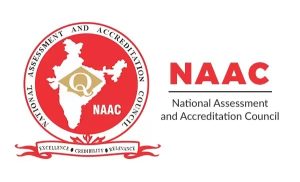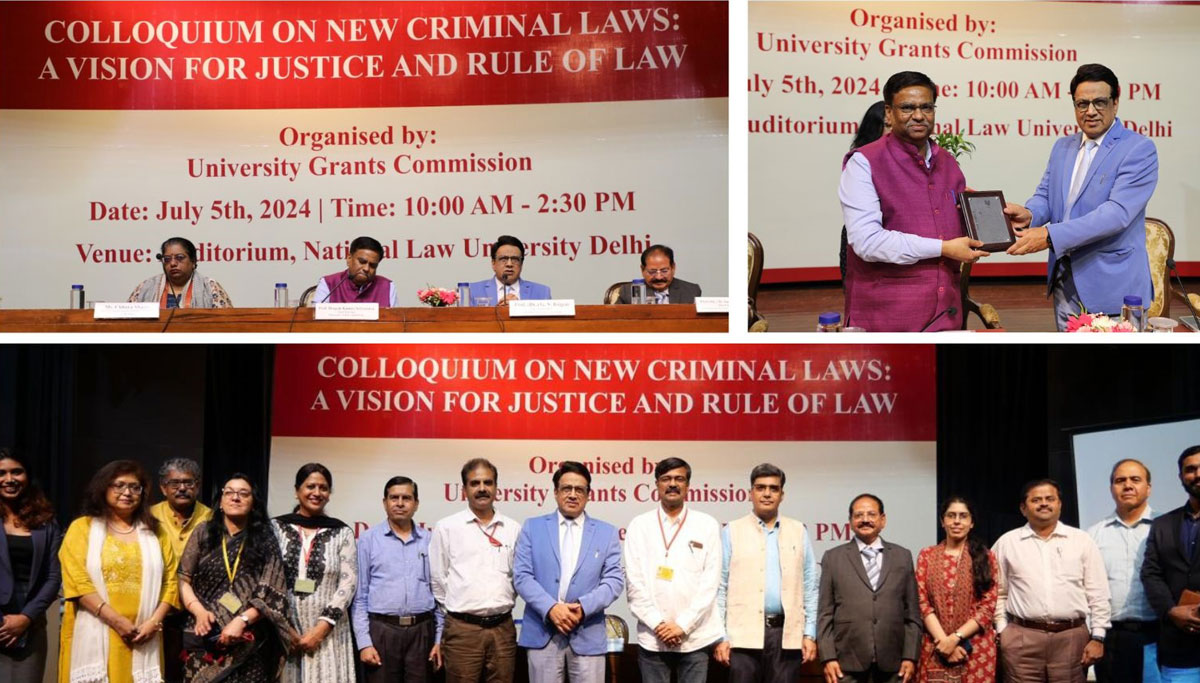The National Law University Delhi successfully hosted a colloquium on "New Criminal Laws: A Vision for Justice and Rule of Law" on July 5, 2024. The event brought together esteemed panelists and moderators to discuss the themes of Bhartiya Nyaya Sanhita (BNS), Bhartiya Nagarik Suraksha Sanhita (BNSS), and Bhartiya Sakshya Adhiniyam (BSA).
The colloquium commenced with a welcome from Dr. Ashima Mangla, Joint Secretary, University Grants Commission. The inaugural session witnessed insightful discussions from esteemed guests. Prof. (Dr.) Deepak Kumar Srivastava, Vice-Chairperson, UGC, highlighted the significant changes in specific statutes and their impact on the Indian criminal law system. Prof. (Dr.) D. Surya Prakasa Rao, Vice-Chancellor, D. S. NLU, Visakhapatnam, compared the swift implementation of new criminal laws to the decades-long process of old laws. Prof. (Dr.) G.S. Bajpai, Vice Chancellor, NLU Delhi shared his expertise on the transformative potential of these laws. Ms. Chhaya Sharma, Joint Commissioner of Police, Delhi, provided a practical perspective on the implementation of key statutes under the Bharatiya Nyaya Sanhita, offering valuable insights from a law enforcement viewpoint.
The program consisted of three interactive sessions, each overseen by distinguished scholars. It was hosted by Ms. Prerna Deep, Academic Fellow, National Law University Delhi.
In Session 1, Prof. (Dr.) Mohammad Asad Malik, Professor, Faculty of Law, Jamia Millia Islamia with panelists Mr. Praveen Sinha, (Spl. Secretary, National Security Council Secretariat) and Dr. Padmini Singh (Director of Prosecution, Central Bureau of Investigation) led a discussion on Efficiency, Accountability, and Fairness in Bhartiya Nagarik Suraksha Sanhita. The main points raised were centered around the amendments to the Code of Criminal Procedure, which include the use of audiovisual recording during search and seizure operations, the mandatory presence of forensic experts at crime scenes for offenses carrying a sentence of more than seven years, the filing of Zero FIRs at any police station, electronic reporting of incidents, and the provision of copies of relevant documents to both the accused and the victim within 14 days of filing. Additionally, the amendment introduces preliminary inquiries for cases with imprisonment terms ranging from three to seven years and community service as an alternative punishment for minor offenses, aiming to reduce prison overcrowding and rehabilitate offenders.
During the second session, led by Prof. (Dr.) Purvi Pokhariyal, Director, NFSU, Delhi Campus. with panelists, Dr. Belu Gupta, Assistant Professor, Faculty of Law, University of Delhi and Mr. Ankit Kaushik, Assistant Professor, NLU Delhi delved into the topic of Bhartiya Nyaya Sanhita: Moving Beyond the IPC. The discussions primarily revolved around the utilization of community service as a punitive measure, the legalization of sedition, and the inclusion of offenses such as terrorism, organized crime, and hate crimes. Moreover, the discussion expanded the scope of rape and sexual assault to cover new crimes like stalking and voyeurism, while also proposing stricter penalties for crimes against women. Nevertheless, critics argue that the suggested reforms might result in ambiguity, excessive empowerment of law enforcement bodies, and potential breaches of constitutional provisions and Supreme Court rulings.
In the third session, under the guidance of Dr. K. A. Pandey, Associate Professor at Dr. R.M.L. National Law University, Lucknow with panellists — Dr. Garima Tiwari, Associate Professor, School of Law, Bennett University and Ms. Shreya Rastogi, Director, Death Penalty Litigation and Forensics, Project 39A, NLU Delhi an analysis was carried out on the Scope and Extent of Reforms in Bhartiya Sakshya Adhiniyam. The session widens the scope of evidence to cover electronic records and loosens restrictions on admissibility. It supports the integration of technology in the collection and presentation of evidence, thereby enhancing safeguards for vulnerable witnesses.
The colloquium underscored the need for a comprehensive approach to criminal law, addressing modern threats and societal concerns. The event concluded with a call for further dialogue and analysis on the implications of BNS and BSA on the Indian criminal justice system.
Prof. (Dr.) Manish R. Joshi, Secretary, University Grants Commission, delivered the closing remarks, emphasizing the importance of the new criminal laws in promoting justice and the rule of law. Dr. Ruhi Paul, Registrar, National Law University Delhi, delivered the vote of thanks.
The colloquium provided a platform for thought-provoking discussions and knowledge sharing among legal professionals, academicians, and students. The event concluded with a lunch reception, where participants had the opportunity to network and exchange ideas. The colloquium was praised for its insightful discussions and the seamless organization, contributing significantly to the development of criminal law in India.





